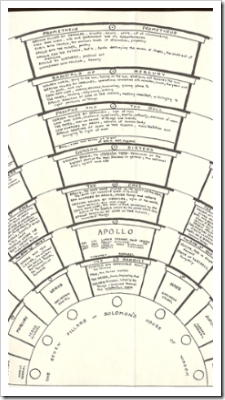 Few of us are ever afforded the opportunity to read so thoroughly and deeply as we once did in college. I am occassionally nostalgic for that period of my life, thinking fondly and even enviously of the boundless amount of leisure time I once had, but did not seem to appreciate. In fact, the overwhelming mood that pervaded my experience of that time was not one of leisure, but rather one of impatience. A fellow student remarked to me, while we were both participants in a seminar with a longish reading list, that she wished deeply to be free of the burden of having all these books still to read. And I suggested that while the reading would indeed be difficult, it would be a great pleasure to one day know that we had mastered these books. She corrected me. Her desire was peculiar. She wanted through some miraculous conveyance to have had already read these books, and to have had already mastered them, rather than to have them before her as a large unknown that only emphasized, by contrast, our state of relative ignorance. She wanted, as many people have in the long history of man, to possess instant wisdom. Upon hearing her describe this desire, I realized that I wanted this also.
Few of us are ever afforded the opportunity to read so thoroughly and deeply as we once did in college. I am occassionally nostalgic for that period of my life, thinking fondly and even enviously of the boundless amount of leisure time I once had, but did not seem to appreciate. In fact, the overwhelming mood that pervaded my experience of that time was not one of leisure, but rather one of impatience. A fellow student remarked to me, while we were both participants in a seminar with a longish reading list, that she wished deeply to be free of the burden of having all these books still to read. And I suggested that while the reading would indeed be difficult, it would be a great pleasure to one day know that we had mastered these books. She corrected me. Her desire was peculiar. She wanted through some miraculous conveyance to have had already read these books, and to have had already mastered them, rather than to have them before her as a large unknown that only emphasized, by contrast, our state of relative ignorance. She wanted, as many people have in the long history of man, to possess instant wisdom. Upon hearing her describe this desire, I realized that I wanted this also.
But all that was said before google and wikipedia. The internet has become, for many, the royal road to wisdom — or at least a simulacrum of wisdom. In virtual communities across the world wide web, arguments are now settled by appealing to wikipedia. Despite the well publicized problems with its reliability, wikipedia is still more convenient than looking things up in a book or relying on a shared education. When one is in want of an argument, political blogs are often the best place to go to find out how one should best defend a given viewpoint. Not only are arguments provided for any topical issue, but even rhetorical flourishes are provided. Nor does one have to cite the source of one’s arguments. Instead one can simply state them as one’s own original viewpoint — they are in a way open source opinions. Finally, when one needs to appear wiser than one actually is, for the sake of one’s virtual community, google readily points to facts, viewpoints, timelines, interpretations on almost any subject, generally in an easily digestible form. And again, citations are completely unnecessary.
These wonderful tools: the internet, google, wikipedia, and the blogosphere, can be used as if they are an extension of our memories. They offer that for which my college friend longed, the ability to possess knowledge, as well as the perspectives and opinions which come with that knowledge, without the laborious effort that once was required to actually gain this knowledge. While there may still be some bragging rights associated with having gained knowledge through one’s own effort, it is fair to ask what is the real difference between this new form of wisdom and the traditional kind that had previously been so difficult to attain? Is it anything more than one of loci: whether the wisdom is contained within our souls or accessed from outside our skulls?
One can already feel the impatience with the state of the technology. As fast as the internet is, it still does not match the speed with which one can recall information from the internal memory. And while a search of one’s recollections is often as uncanny as Plato’s aviary it still tends to be less tendentious, if also not so extensive, as a google search. The technology, however, much like we once said about the mind, can be improved. As the interface between our minds and the cavernous stores of memory available on the interenet improves, the separation we perceive between the two may eventually become a mere figment, a virtual oddity future generations will read about on a future wikipedia to better understand how people used to think.
